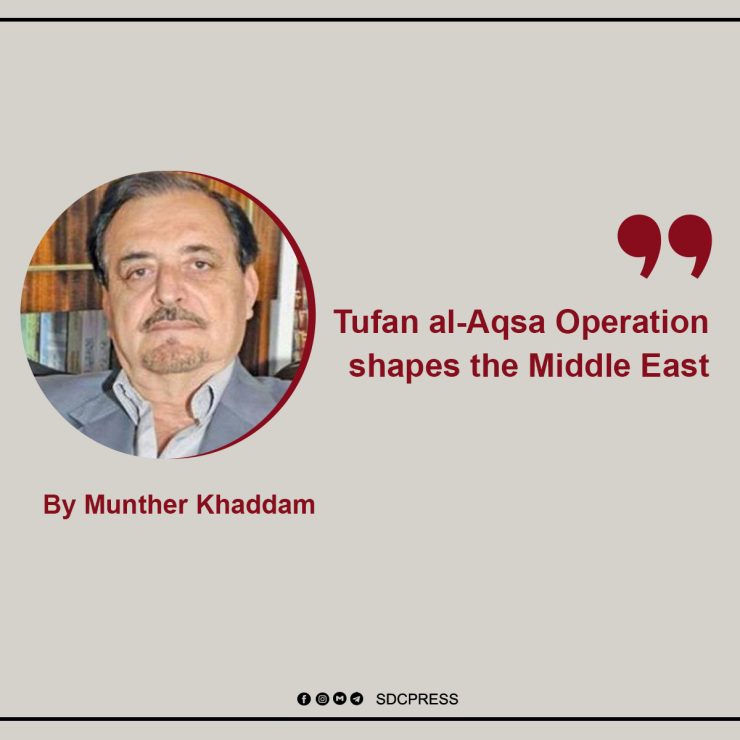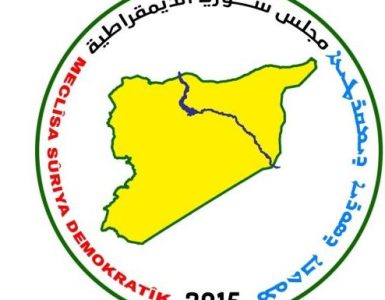By Munther Khaddam
Almost all the interested in Middle Eastern affairs, regardless of their affiliations, agree on one matter that Israeli attacks on Gaza on October 7, 2023, became a pivotal and decisive event. It has been a critical date, shaping the relationships of many regional and global countries with it. It can be said that when the current events of the region are written in the future, they will be guided by the phrase “The Pre- or Post-Israeli attacks on Gaza”, focusing on the aftermath of the specific date when the attacks occurred.
On a global scale, significant changes have been occurring not only at the level of governing authorities but also in public awareness regarding the Palestinian issue. That was particularly evident in Western countries that have traditionally supported Israel.
A report presented to the U.S. Congressional Intelligence Committee highlighted a noticeable change in American public opinion that supported Israel in the past, but it currently supports the Palestinian cause. A similar phenomenon has been observed in several European countries, such as France, Britain, and Germany, where longstanding pro-Israel policies have been surpassed. Remarkably, Ireland has severed its ties with Israel and actively endorsed the Palestinian cause.
Furthermore, academic and intellectual people in many European nations have reconsidered the Palestinian cause. Notably, the University of Edinburgh in Scotland has played a crucial role in this field. The university officially announced, in a document issued on December 14, 2023, its adoption of a “Decolonization Plan” and extended an “apology” to the Palestinian people for the Balfour Declaration of 1917.
Alos: SDC assesses the current stage to outline a strategy for future actions
It is known that Arthur James Balfour, who issued the Declaration of 1917, had held the position of Chancellor at the University of Edinburgh for a very long period from 1891 to 1930. After that, he held the position of Prime Minister. Therefore, the intellectuals in the university feel that they assume a certain responsibility for issuing Balfour’s Declaration.
The significant impact of the Tufan al-Aqsa Operation will extend to regional countries, albeit with varying degrees of severity. On the Israeli front, the conflict in Gaza has deeply shaped the mindset of broad segments of Israelis. It will affect many of the convictions and behaviors that appeared to be entrenched, such as the belief that Israel is influenced by several factors, including its military forces, technological achievements, democratic governance, economic power, and support by Western countries.
As a result of this deep impact, it is likely that significant changes will occur in Israel’s political and security landscape. Initially, this situation might result in Benjamin Netanyahu losing his role as Prime Minister and potentially retiring from politics entirely. Also, his right-wing coalition would likely be eliminated. Undoubtedly, investigations will take place in Israel regarding the security and military failure that allowed Hamas Movement to attack it. This may lead to the dismissal of a group of Israeli security and military leaders.
However, the most crucial change expected to be happened regarding the Israeli Zionist mindset is
a shift in the thoughts and opinions of Israelis regarding the Palestinian issue. It is expected that absolute rejection of peaceful solutions will decline, and Israelis will increasingly accept the establishment of an independent Palestinian state.
According to some Israeli media and political sources, Israel’s long-term interest lies in not waging a war in the region. The United States and several European countries have already begun working on this goal. However, achieving an internationally accepted solution which is embraced by Arab and Palestinian communities may trigger a significant migration from Israel to other countries, especially among dual citizens. Some media reports estimate that around 800,000 people have already left Israel permanently.
Based on the confirmed outcomes of the conflict in Gaza, the Palestinian issue is being taken the priority regarding international discussions. Numerous indicators suggest that this time, it will be addressed with genuine seriousness.
This is affirmed by statements by the U.S. administration and its foreign minister, as well as many leaders of Western countries, Russia, China, and numerous other countries. They emphasized the need for political solutions after the cessation of the conflict in Gaza.
One direct consequence of the conflict in Gaza is the elimination of normalization that was to be underway among some Arab countries and Israel. According to Saudi sources, Crown Prince Muhammad bin Salman has stated that his country is no longer interested in normalization with Israel unless it occurs in the context of a comprehensive settlement of the Palestinian issue.
On the other hand, the conflict in Gaza has practically disrupted the U.S. project to engage a new party in the region. Saudi Arabia and Israel were main pillars for the United States in the region. It is known that the U.S. has been working on this project since 2022, with further details emerging during the G20 summit. The project involves creating a new trade route connecting India to Europe via the UAE, Saudi Arabia, Jordan, and Israel.
Regarding Syria, the Tufan al-Aqsa Operation is unlikely to impact on the Syrian regime decisively. It is probable that the regime will not face the potential changes, whether in policies or projects. Instead, there will be changes that make the regime more open to engage in dialogues with democratic national forces within the Syrian opposition. Moreover, their participation in governance can enhance the regime’s resilience to external pressures. The Syrian regime relies on the support of its allies, particularly Iran, which has reportedly engaged in understandings with Washington on this matter. According to lawyer Ayman Abu Hashem, coordinator of the “Syrian Palestinian Destiny Gathering”, the most likely scenario for Iran-U.S. understandings regarding the non-expansion of the conflict in Gaza is maintaining the Syrian regime and the repositioning of Iranian presence in Syria with U.S. legitimacy.
Actually, the Syrian regime did not depend on Iran-U.S. agreements to prevent provoking Israel.
Previously, it refrained from responding to Israel’s repeated attacks on various sites in Syria, including civilian locations like Aleppo and Damascus International airports. Notably, the regime controls three ground-to-ground missile brigades capable of targeting any location in Israel. However, according to local sources cited by al-Quds al-Arabi Newspaper, the conflict in Gaza prompted the regime, in coordination with Iran, to take precautionary measures. These measures include allowing Hezbollah and other affiliated militias to position in areas adjacent to Israel.
In fact, the impact of Tufan al-Aqsa Operation will affect all Arab countries, whether on Arab presidents or on populations. So, presidents face numerous obstacles due to the policies entrenched by the U.S. over past decades. Therefore, the acceleration of changing the political and cultural mindset among Arab populations could lead to the eliminating of policies entrenched in the region if the conflict in Gaza persists. Western countries and many Arab presidents are wary of this scenario.
Regarding al-Aqsa turmoil, Iran has played a major role in regional issues. The Iranian influence includes Hezbollah’s involvement in the war against Israel to support Palestinians in Gaza. Also, it includes the involvement of Houthis in Yemen and their affiliated militias in Iraq against U.S. and Israeli interests. The U.S. and other Western countries recognize that any solutions to the crises in the region won’t happen without Iran’s participation. This means that Iran can negotiate favorable terms in various domains.
There is a movement in Yemen advocating for a political regime similar to Iran’s, with Abdul-Malik al-Houthi positioned as a leading figure.
Additionally, agreements have been reached between the U.S. and the Iraqi government regarding a timeline for the withdrawal of U.S. and allied forces from Iraq.
As for Syria, Iran has gained some advantages by not directly confronting the Syrian regime, while still posing a threat to Israel. Therefore, as part of resolving the crisis, Iran will likely advocate for normalization of relations with the Syrian regime, not only regionally but also internationally, contingent upon lifting sanctions.
Also: Divisions and interventions contribute to fragmentation of the Syrian opposition
Turkey will significantly seek to capitalize on the aftermath of “Tufan al-Aqsa” to enhance its influence in the region. Turkey has emerged as a guarantor for any settlement in Gaza, utilizing its positive relations with both Israelis and Palestinians. Additionally, there are indications that the United States supports this role, according to certain Turkish and U.S. media sources. It appears that Turkey’s demands, in exchange for playing this role, will primarily relate to Syria. Specifically, it involves the relationship between the U.S. and the Syrian Democratic Forces (SDF), as well as the presence of the Autonomous Administration of North and East Syria (AANES). Recently, President Erdogan has stated that he will not accept the presence of any separatist entity along its southern borders. Also, Turkey actively seeks to control the area extending 30 to 40 kilometers deep in Syria; the area held by the AANES. Russian Foreign Minister Lavrov also stated that a settlement between the Syrian regime and Turkey has become impossible after the Tufan al-Aqsa Operation, likely referring to Turkey’s recent assertive stance, as reported by some media outlets.
It is obvious that China and Russia closely monitor the events in the region, hoping that the United States and other Western countries become more deeply involved in the crisis resulting from the conflict in Gaza. They seek political and strategic gains from this situation. Indeed, these gains have already materialized due to the unlimited U.S. support for Israel politically and diplomatically. Additionally, the U.S. has supplied Israel with necessary military equipment and reinforced its fleets in the Mediterranean Sea. Also, it deployed over two thousand soldiers and military experts to Israel.
As for Russia, interest in the war in Ukraine has generally waned by Western countries. Furthermore, Russia has been playing a role in facilitating the conditions for stability in the Middle East by working towards Palestinian unity. Some reports suggest that Russia is coordinating this effort with the United States.
As for China, it has gained from the United States’ preoccupation with Middle Eastern affairs, which has diverted attention from South Asian tensions, according to Chinese discourse. China now prioritizes its economy even more. It appears that the “Tufan al-Aqsa Operation” has also affected China’s influence in certain regional countries. This is evident in the U.S. request for China to invest its influence in Iran, aiming to exert pressure on the Houthi group to maintain security and safety in the international waterway of the Bab el-Mandeb Strait, the Arabian Sea, and the Red Sea.
The strategy that intended to diminish the strategic importance of the region was adopted by George W. Bush in the Arab region and implemented by Obama. It also was leveraged politically and economically by Trump. The goal was to shift focus towards countering China in the Far East, especially as Russia became involved in the war in Ukraine. However, the Tufan al-Aqsa Operation has completely disrupted the regional dynamics, leaving Western countries once again entangled in their own problems. Consequently, there are now discussions among Western powers about the necessity of returning to a stability-oriented strategy for the region. This requires finding lasting solutions to its challenges. One proposed approach is convening an international conference involving all relevant local, regional, and international parties.




